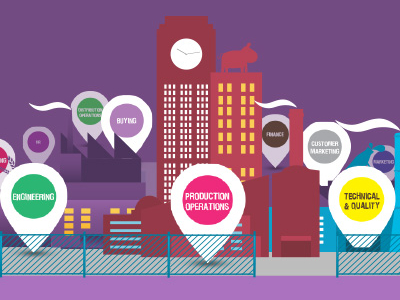What’s it all about then?
The company development chef specialises in the development of new food products.
This normally happens by testing different recipes for products that maintain their flavour, appearance and texture after they’ve been processed, sold by the retailer and then reheated by the customer.
As a development chef, you’ll be closely involved with other new product development staff and you’ll also be performing research into both the product and the potential market for it.
You’ll be someone with their eye on future developments and consumer trends and you’ll have a real passion about food!
What might I be doing?
This is often a varied role with duties depending on what company your work for and the sector in which the business operates but your job will usually include:
- Formulating new recipes and improving existing ones which keep your company ahead of the competition
- Recommending new products and working with new product development staff to transform food concepts into viable products
- Liaising with colleagues in the commercial, production and technical departments
- Liaising with suppliers to ensure that your company is aware of new ingredients coming on to the market
- Identifying market niches and opportunities into which existing products could be adapted and new products developed
- Conducting consumer testing and taste panels for proposed new products
- Presenting new products to potential trade customers
- Ensuring that potential new products can be manufactured profitability and meet food safety requirements
- Evaluating the success of new products in their markets
- Continuously researching the market and staying ahead of consumer trends
What will be expected of me?
You’ll be expected to have experience in top quality restaurants and have a creative mind and the ability and passion to develop innovative products for your company.
You’ll have to be able to develop recipes that can be made using food manufacturing processes whilst at the same time making sure that these recipes are innovative and creative.
This means understanding mass production techniques and machinery as well as the specific qualities and shelf-life of different ingredients as well as costings, technical issues and so on.
It’s important that you’re a people person with good communication and influencing skills because you’ll be talking to a wide variety of people to get your ideas accepted – not only your work colleagues but suppliers and also potential customers.
In many instances you’ll be expected to meet tight deadlines so you’ll be comfortable in high-pressure situations and able to work effectively.
What can I expect?
You can expect to work fairly regular hours; certainly in comparison with what you’ve been used to if you’ve been working in a restaurant!
There will likely be a lot of travel in the job to meet suppliers and customers and you might be surprised to discover how much of your time is spent in meetings away from the development kitchen.
What qualifications do I need to get in?
It is extremely likely that you’ll be a trained and experienced chef for this post, although you may have been appointed with a degree in food technology or food product development.
Your qualifications could include the City & Guilds diploma in professional cookery, available at levels 1, 2 and 3 to name but one of a wide range available.
Where would I get these qualifications?
Catering and culinary qualifications are available at all of the local Further Education Colleges and these will have prepared you to start work in a restaurant or hotel kitchen to learn the trade.
You could also study for a BSc in Culinary Arts Management if you wished to avail of Higher Education.
What about further training?
Many of the courses available at FE level can be studied on a part-time basis when in your first job. You may go on to take several of these to augment your on-the-job experience with a qualification.
Anything else I might need to know?
For the job of development chef, you should note that most companies will need experienced chefs so you need to be prepared to knuckle down and get the right mix of qualifications before considering going for a post like this.
But remember that the level of job satisfaction in this role make it well worth the effort – after all what could be better than seeing a product that you developed on the shelves of the major supermarkets?
 cy
cy





